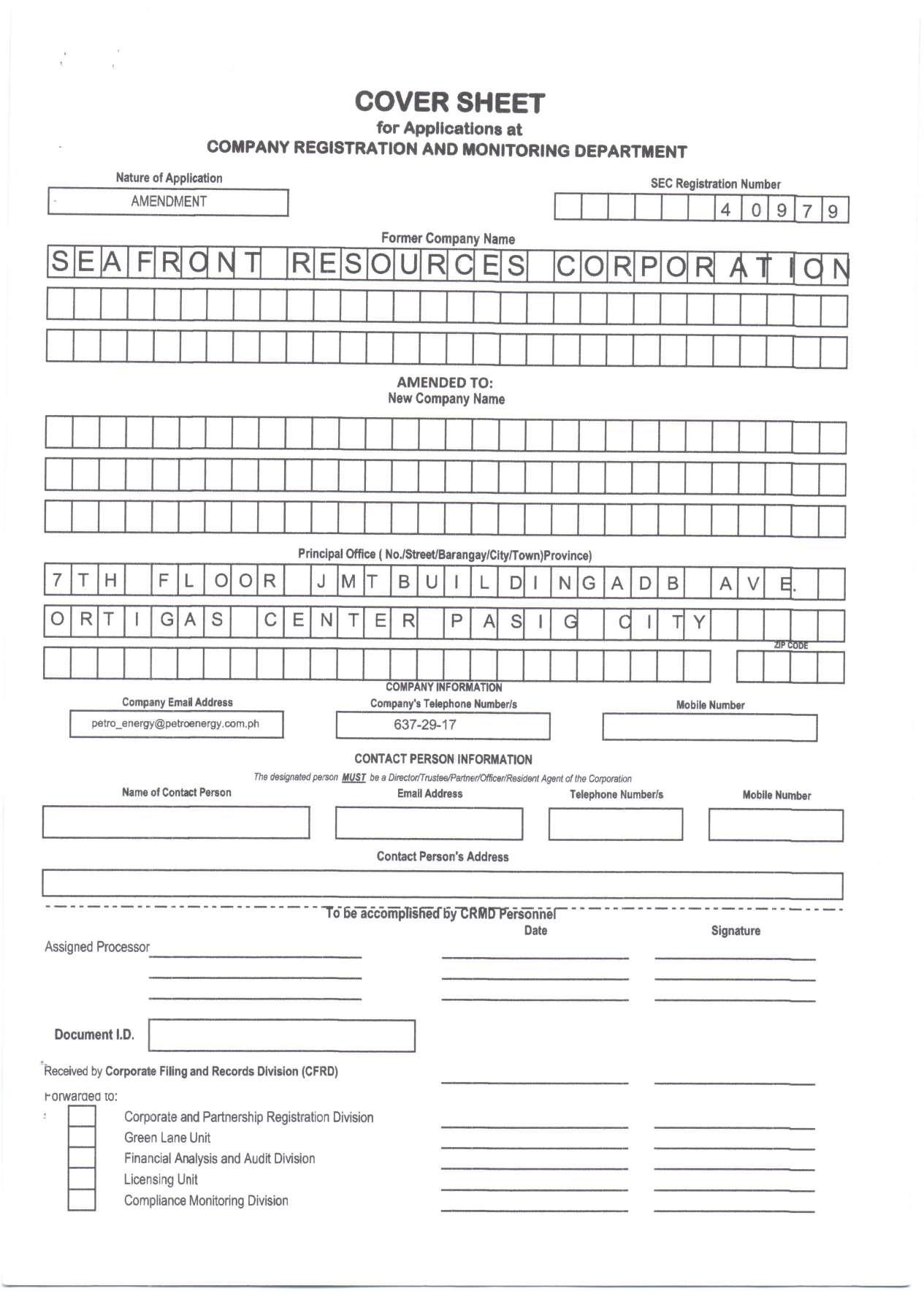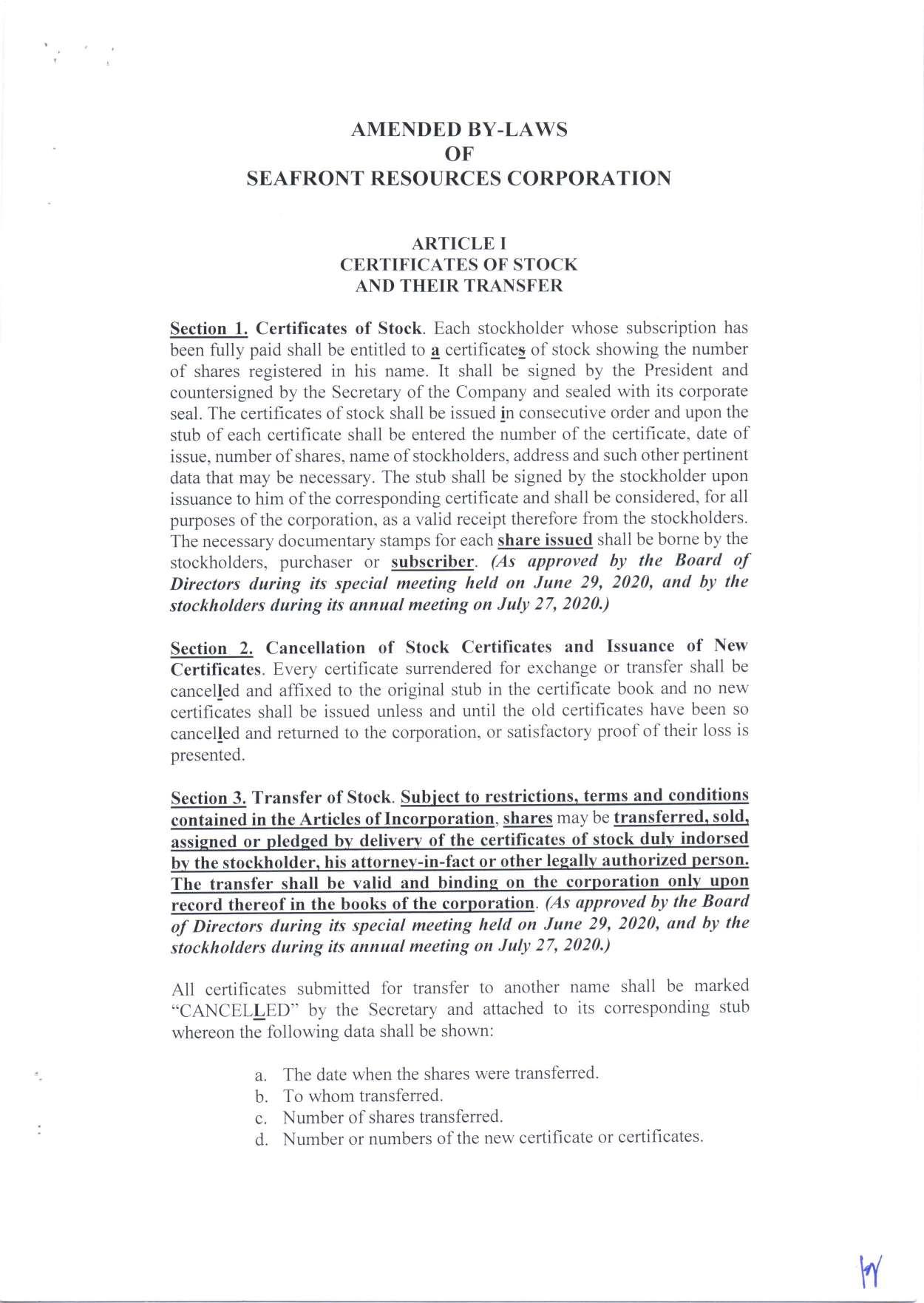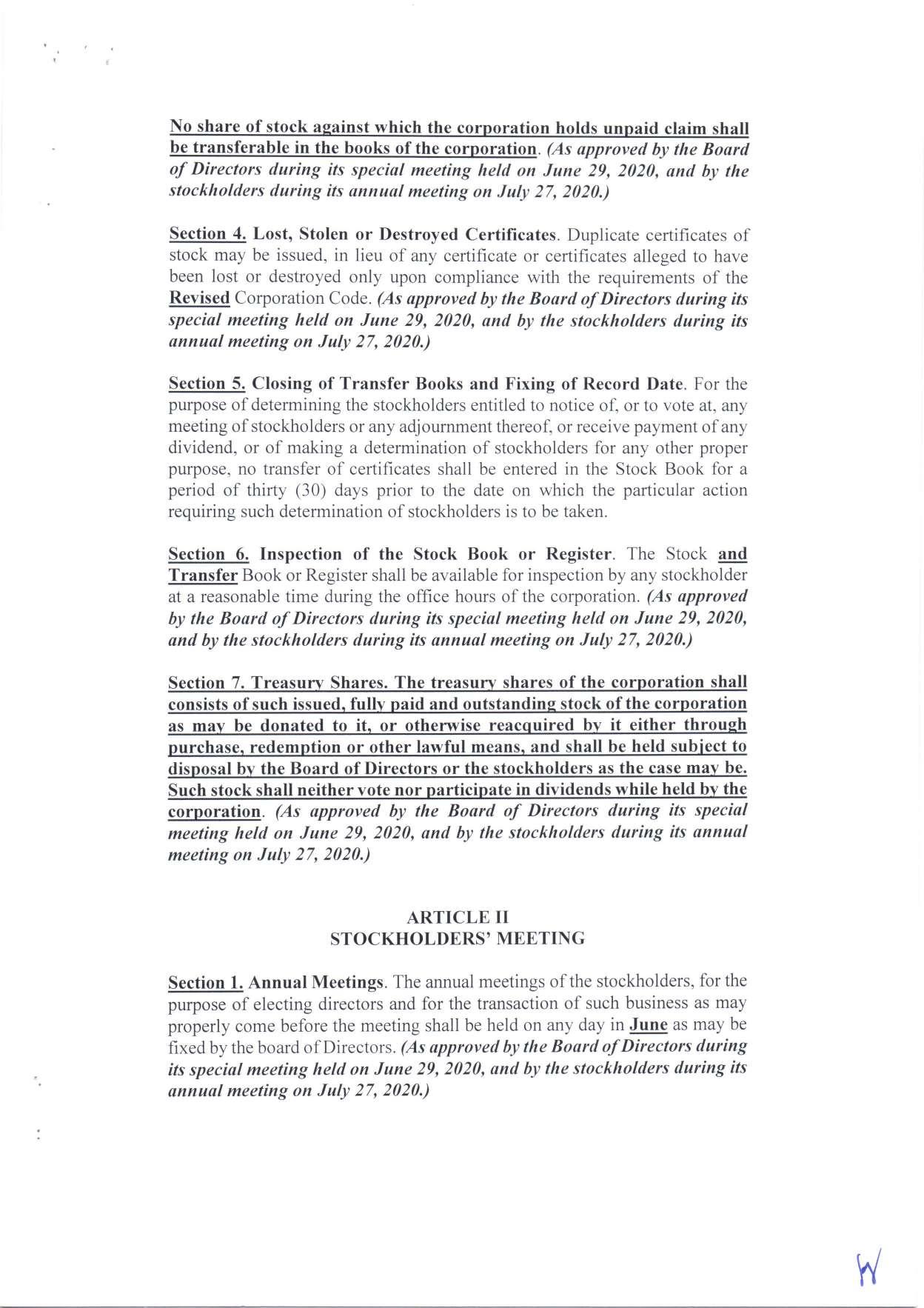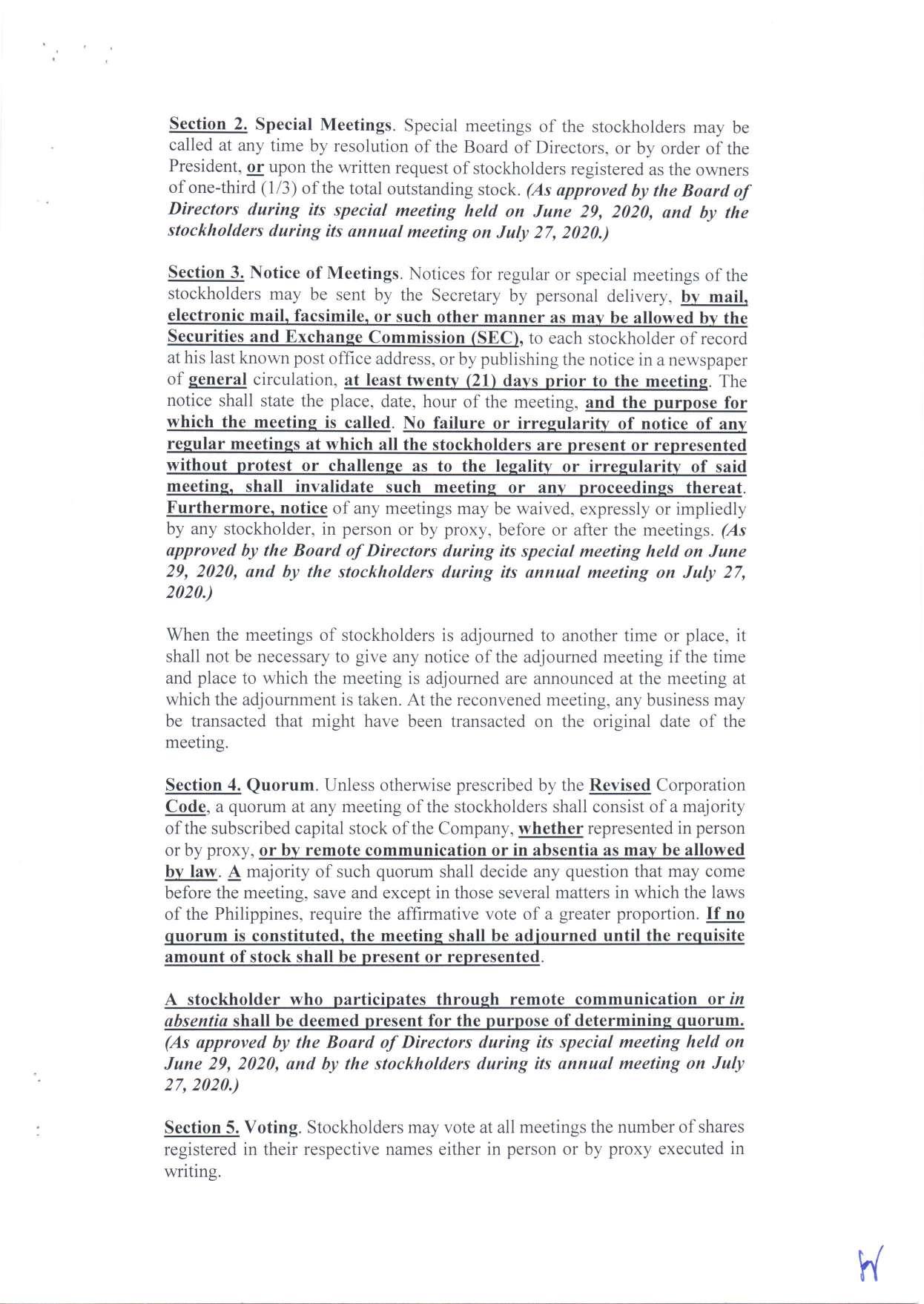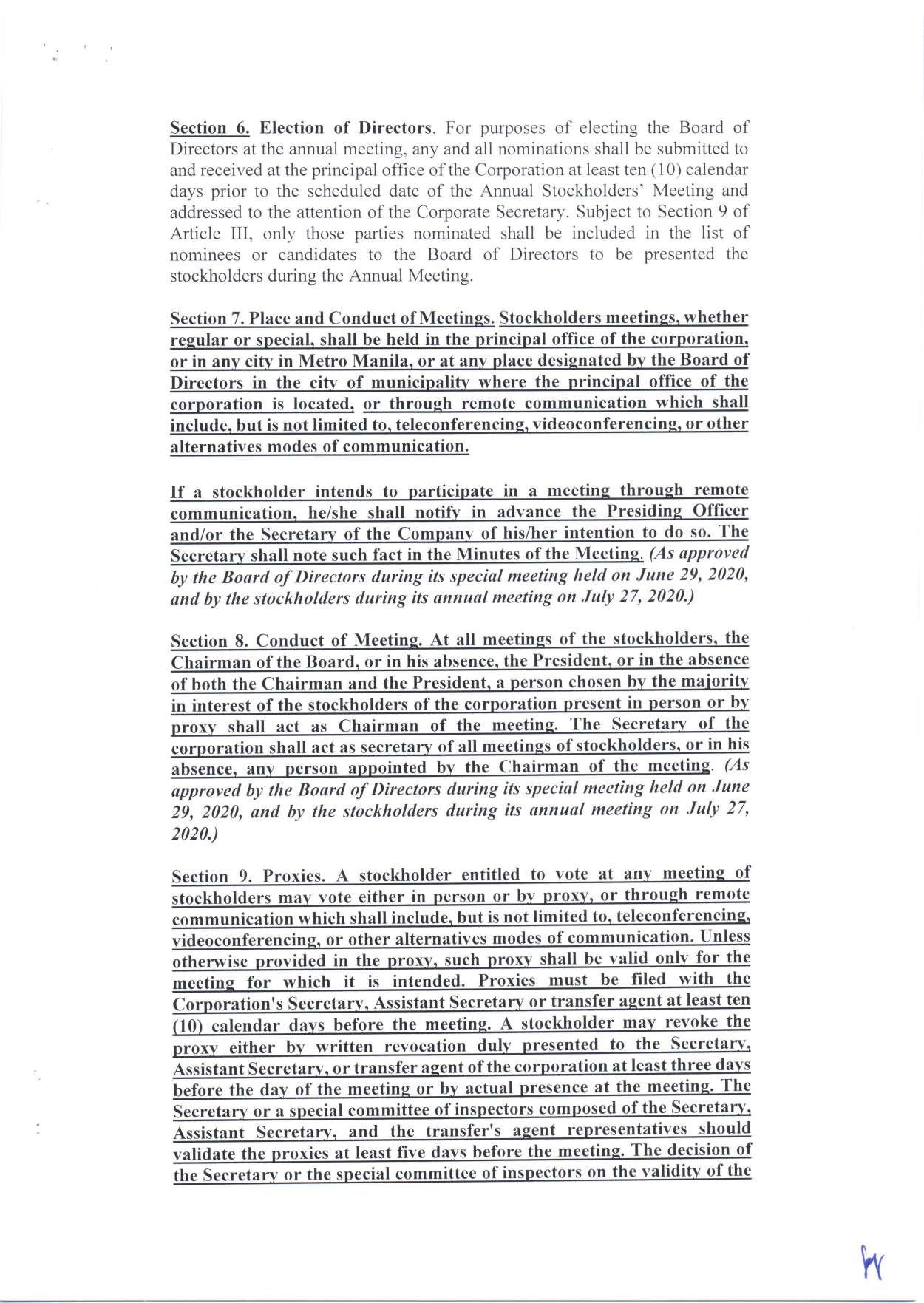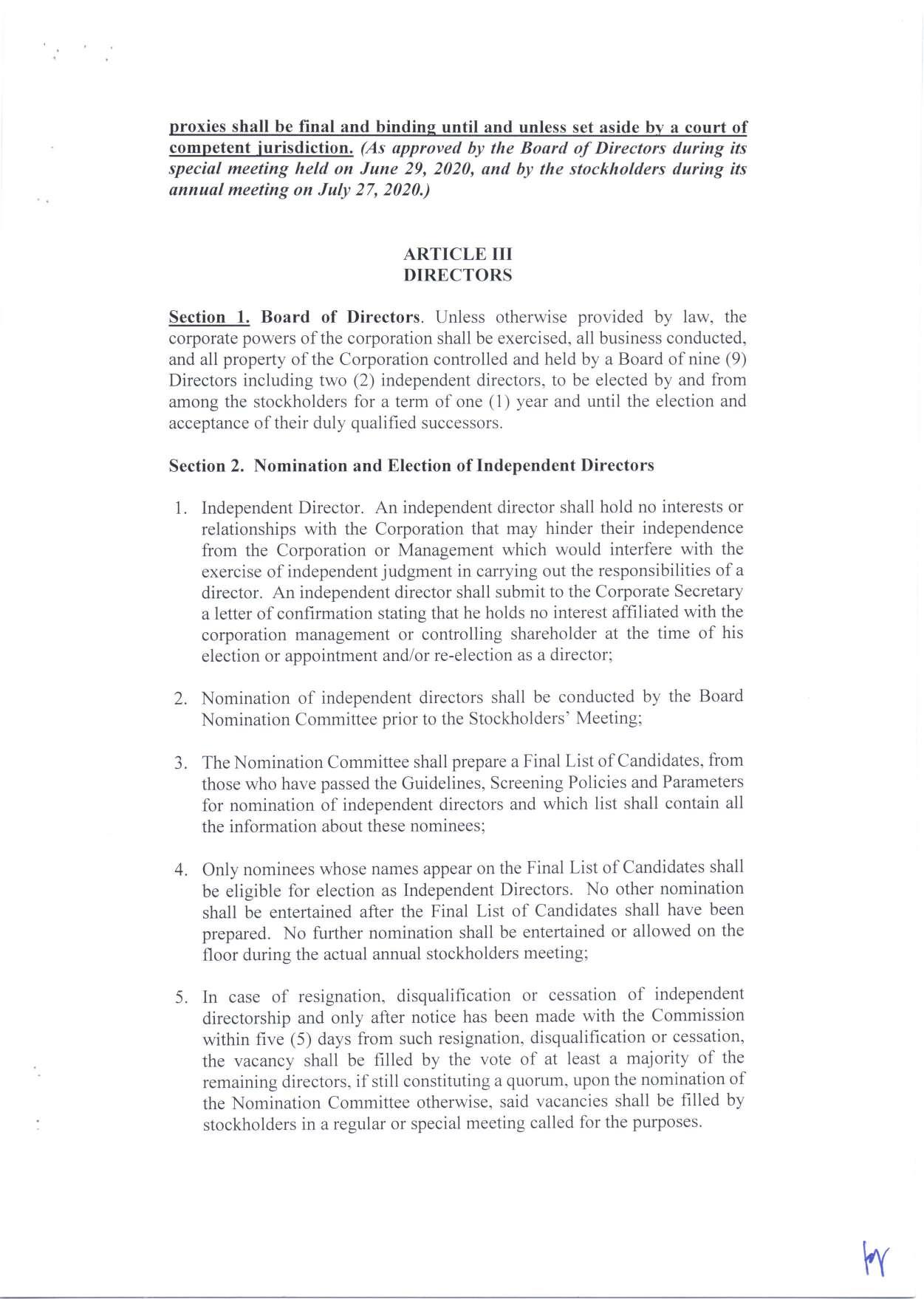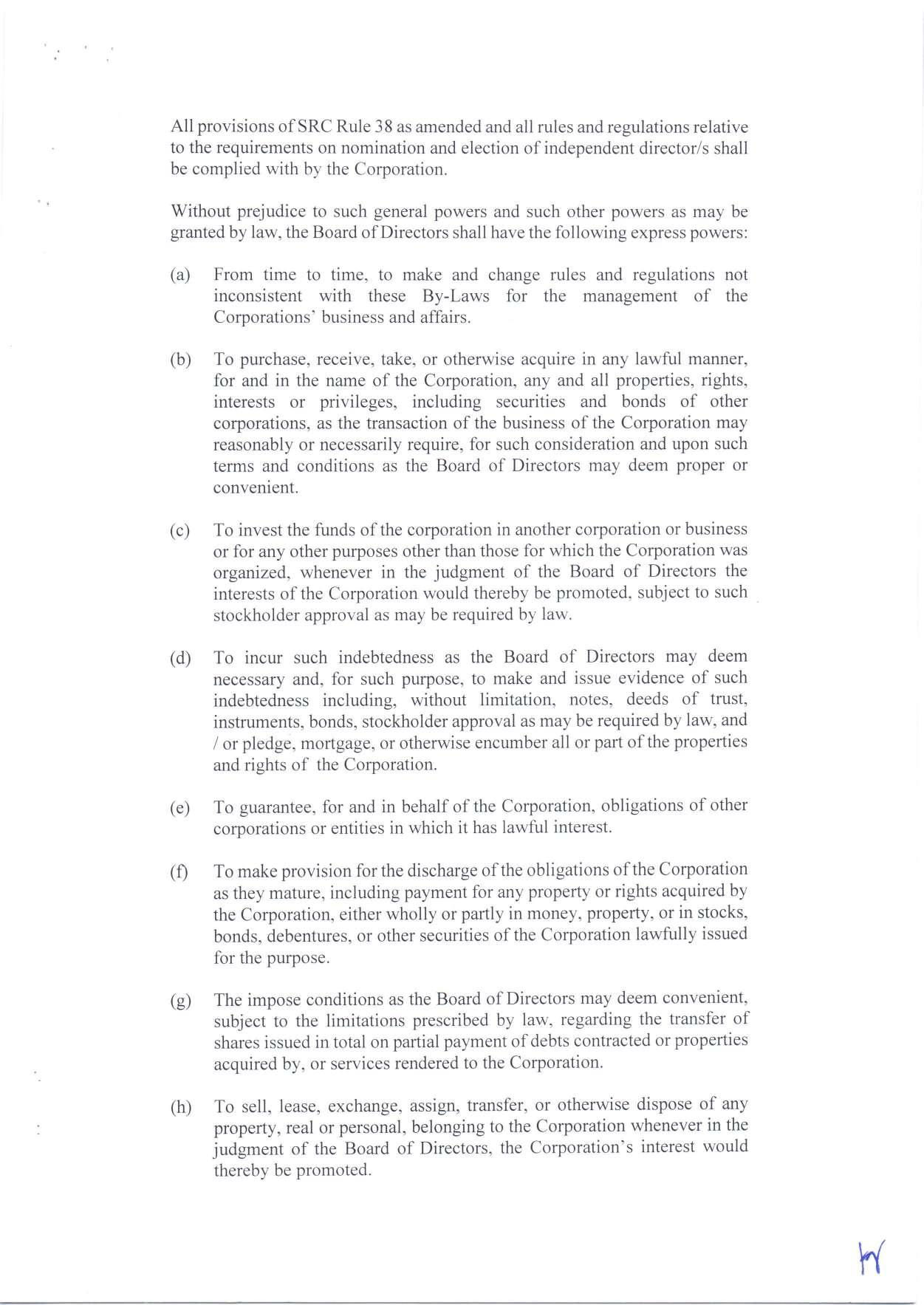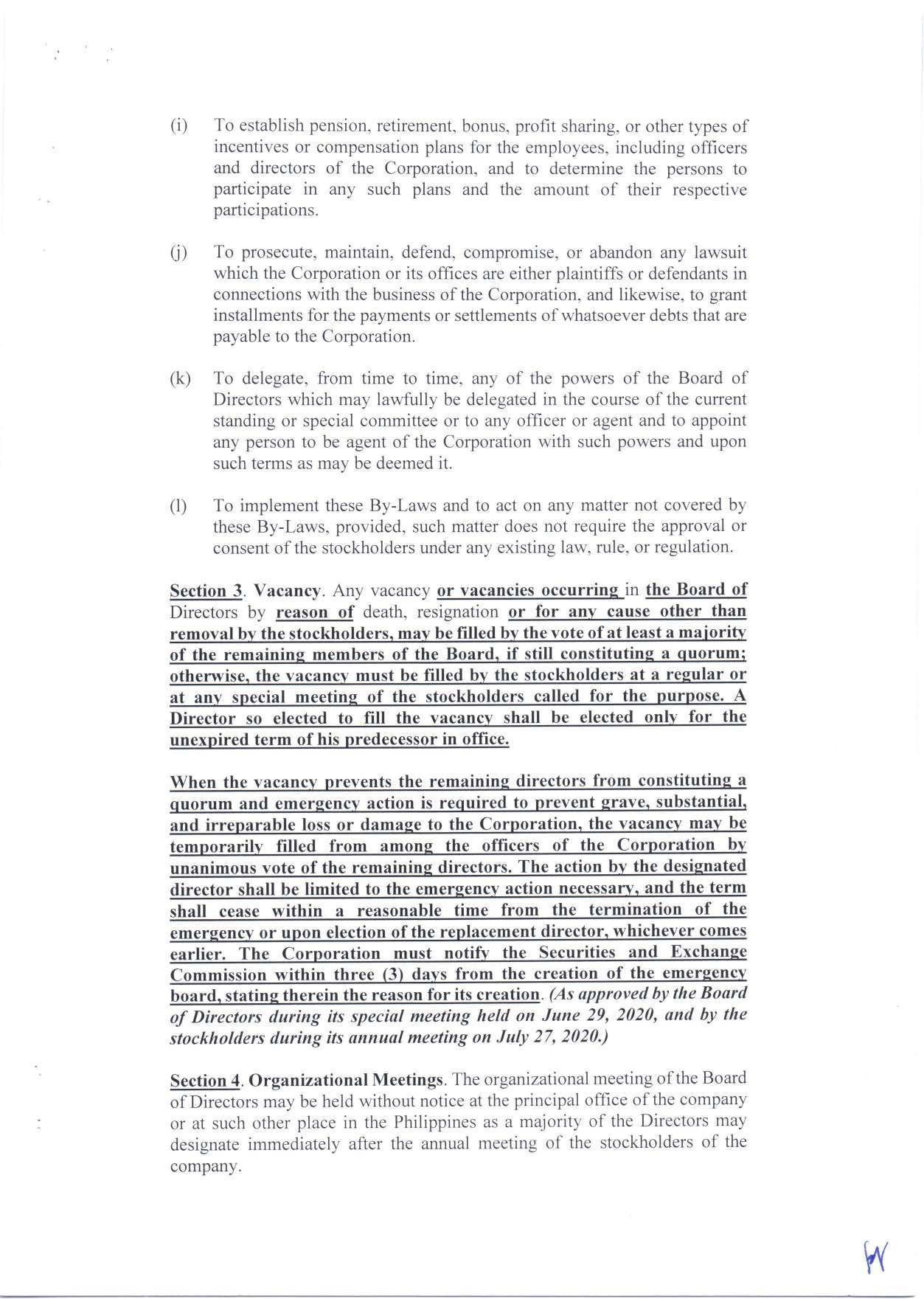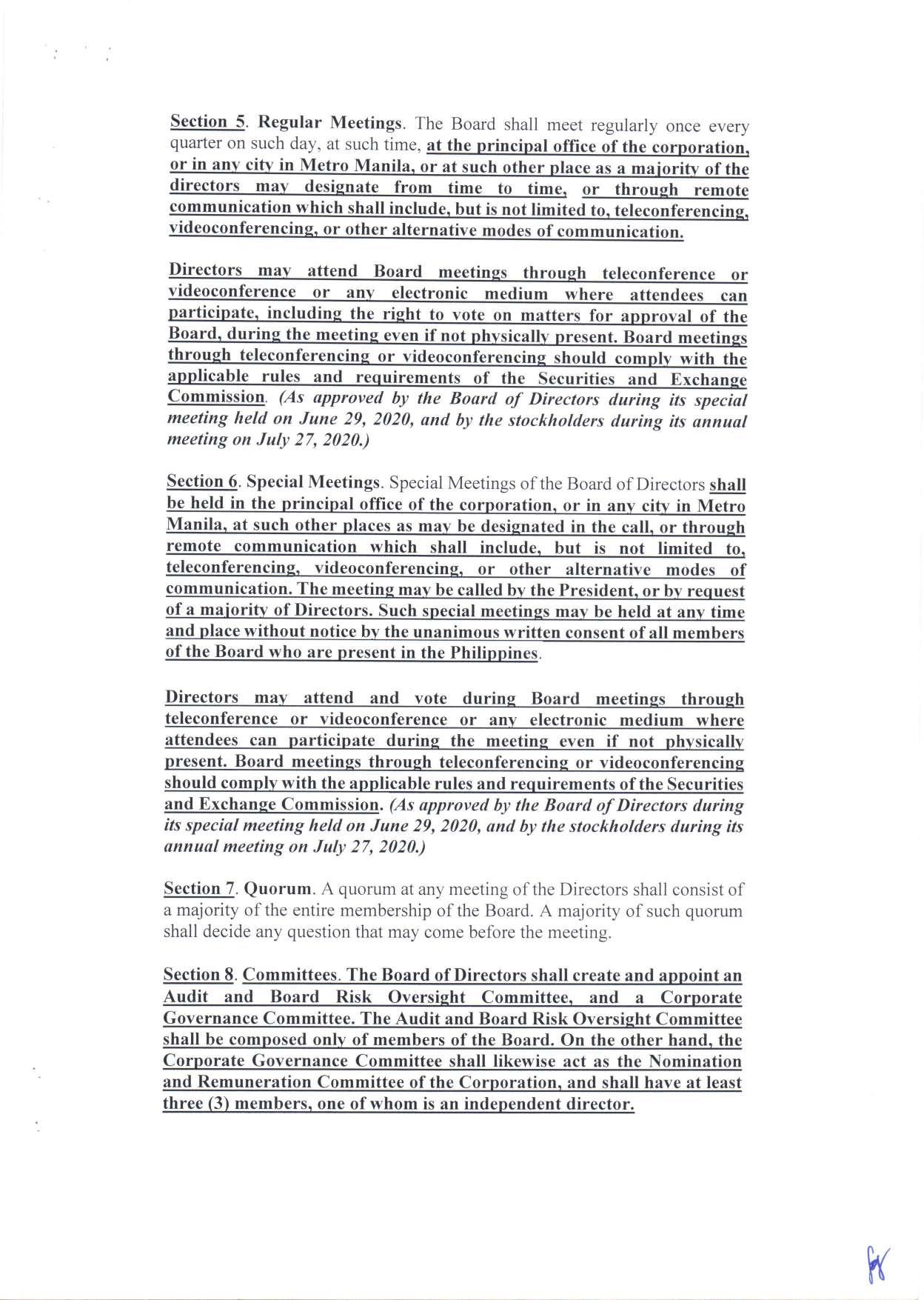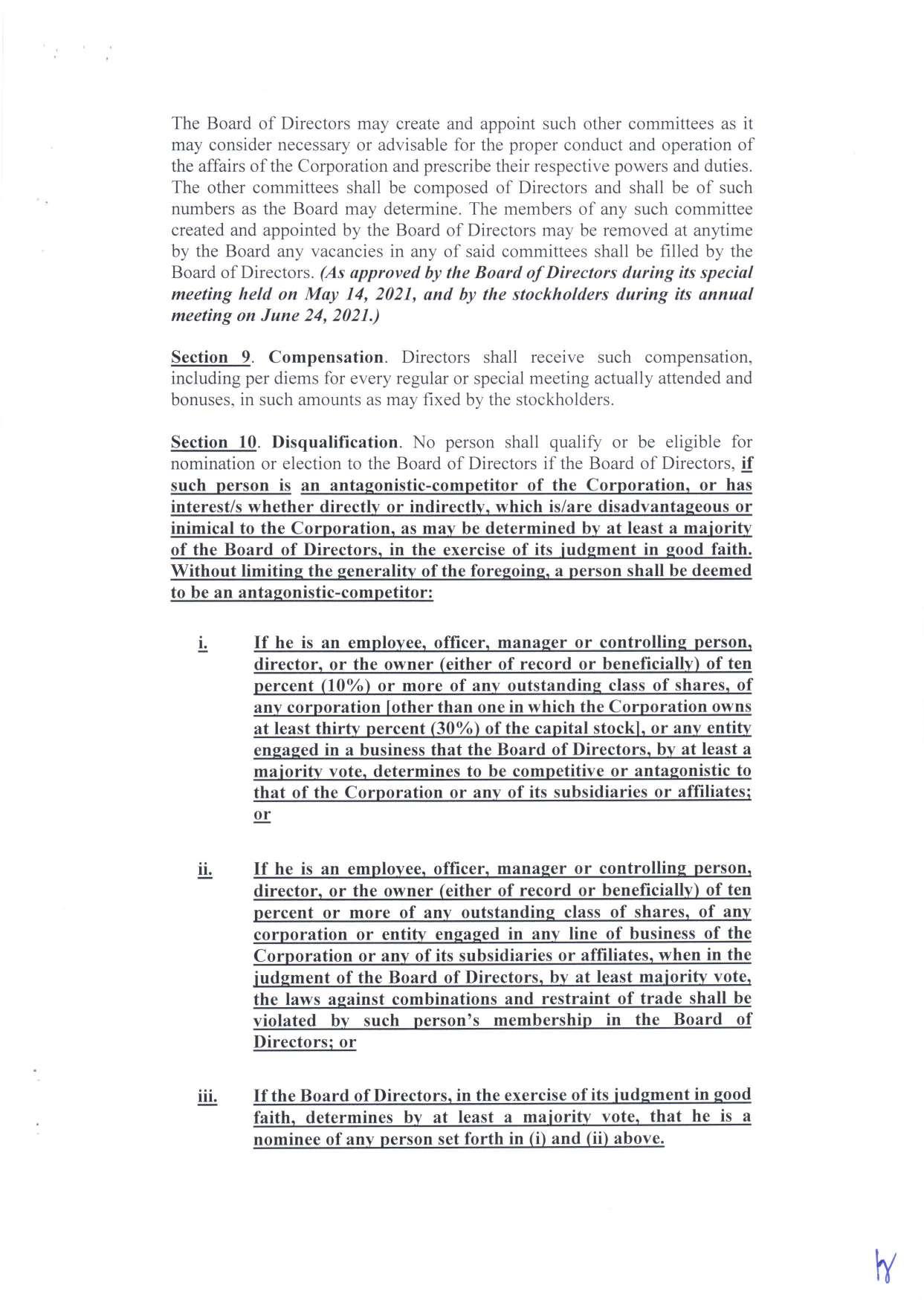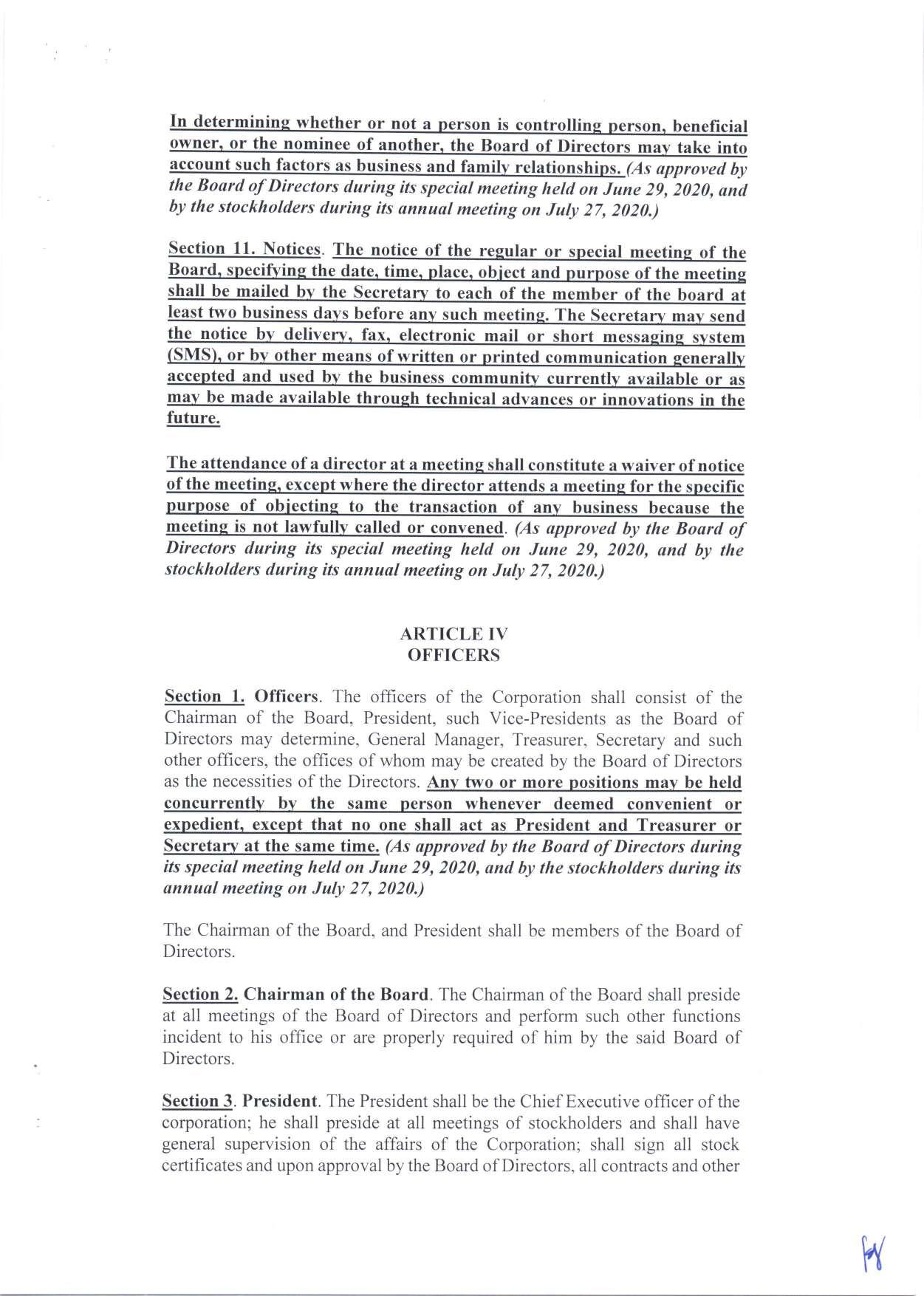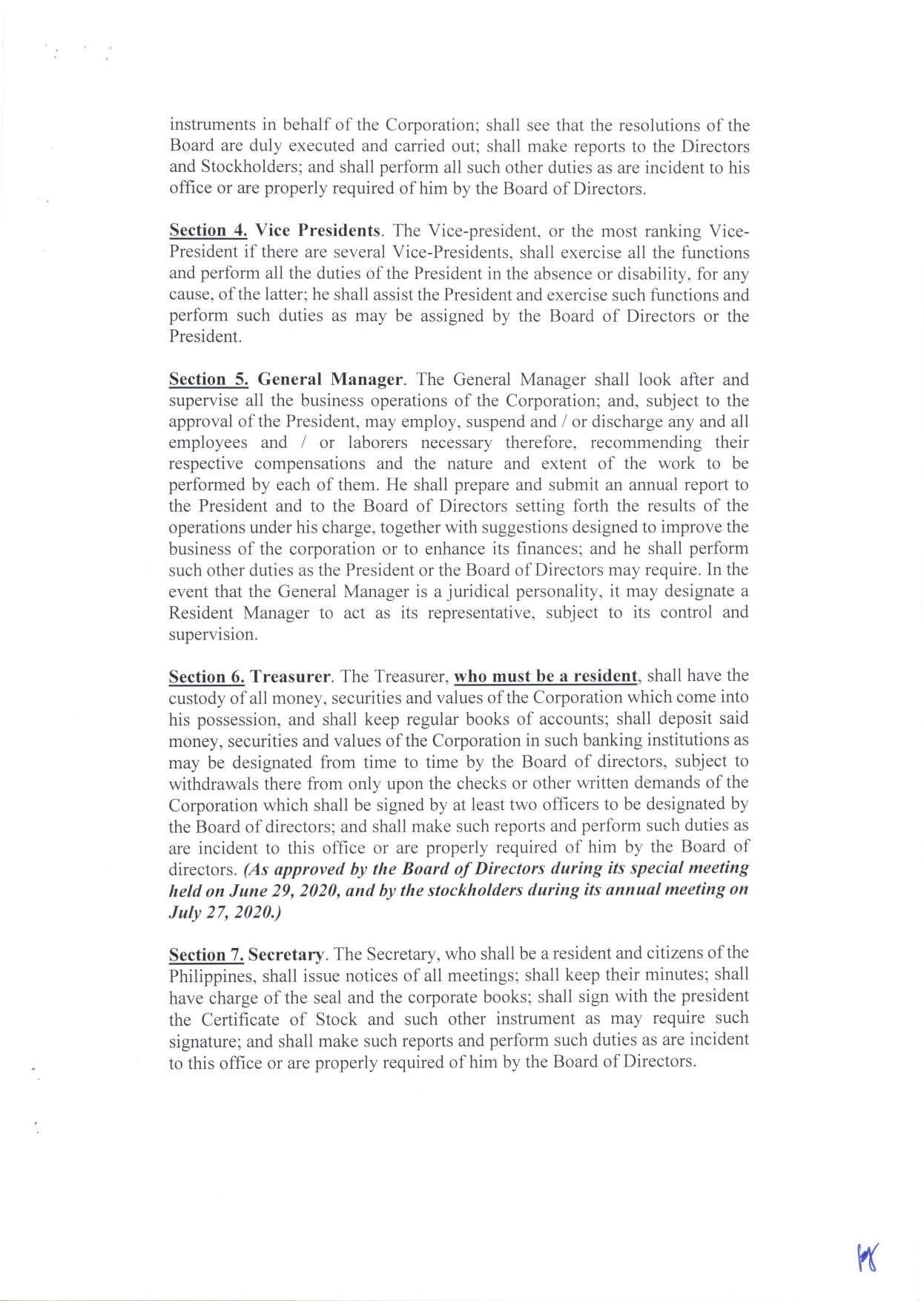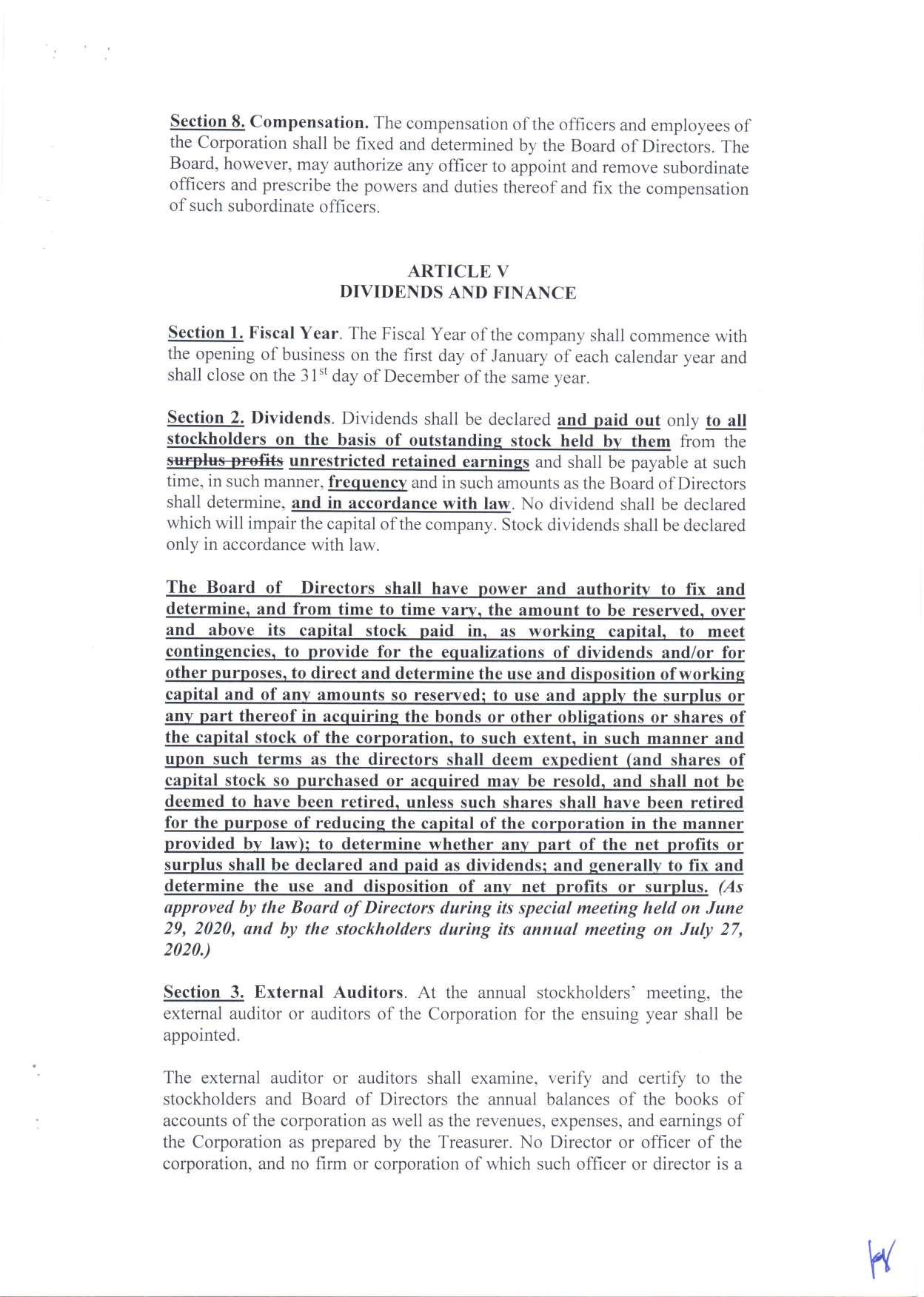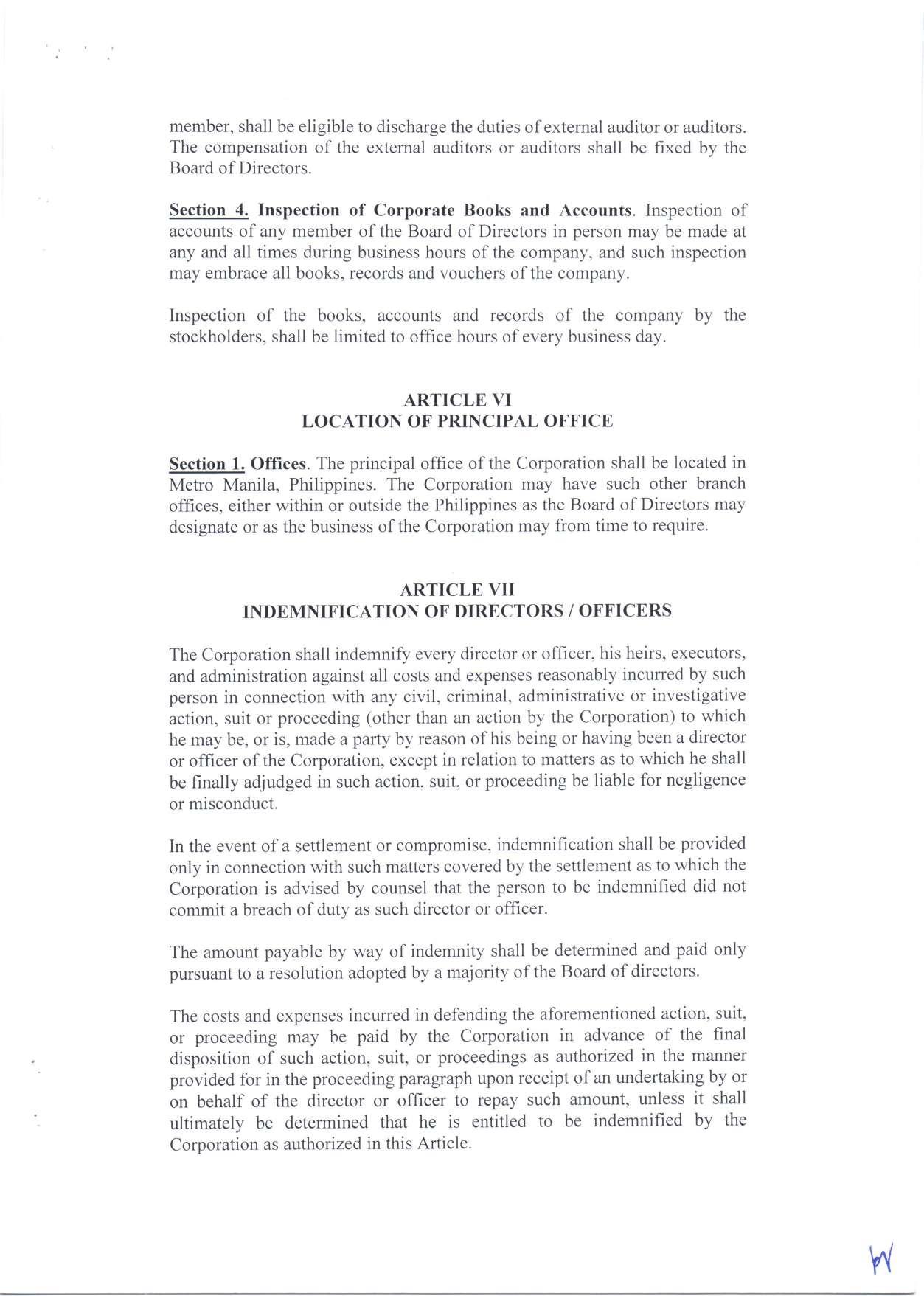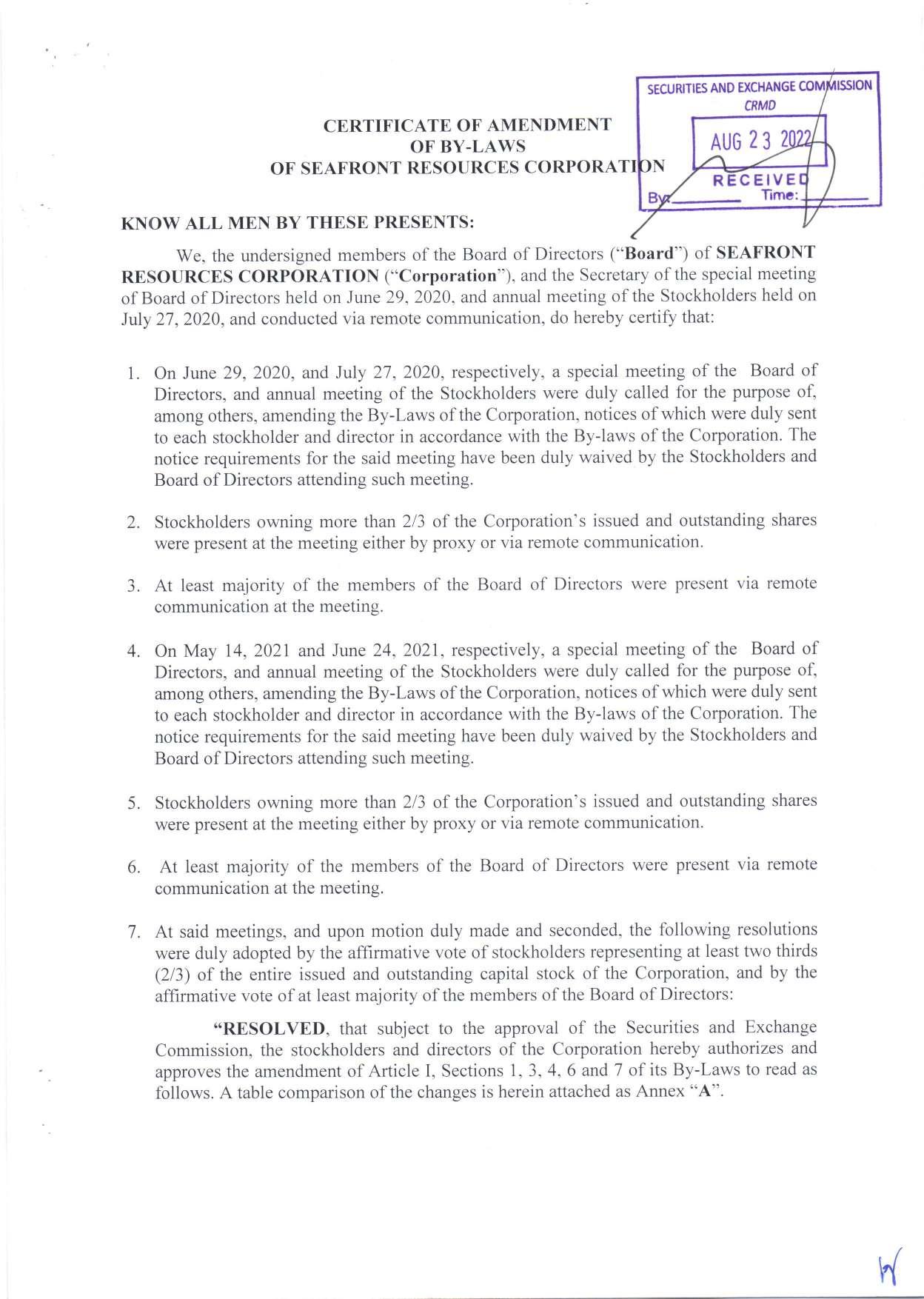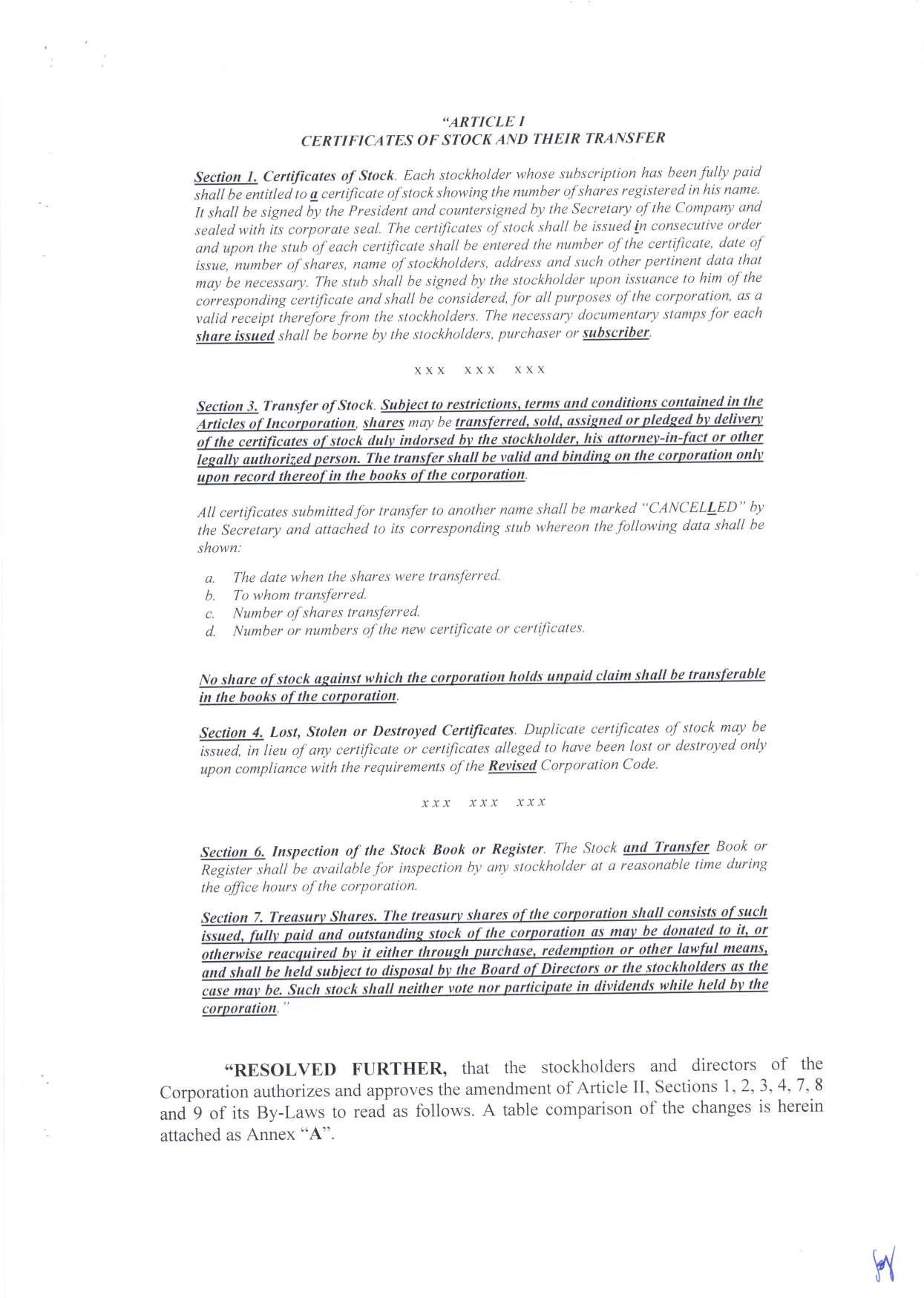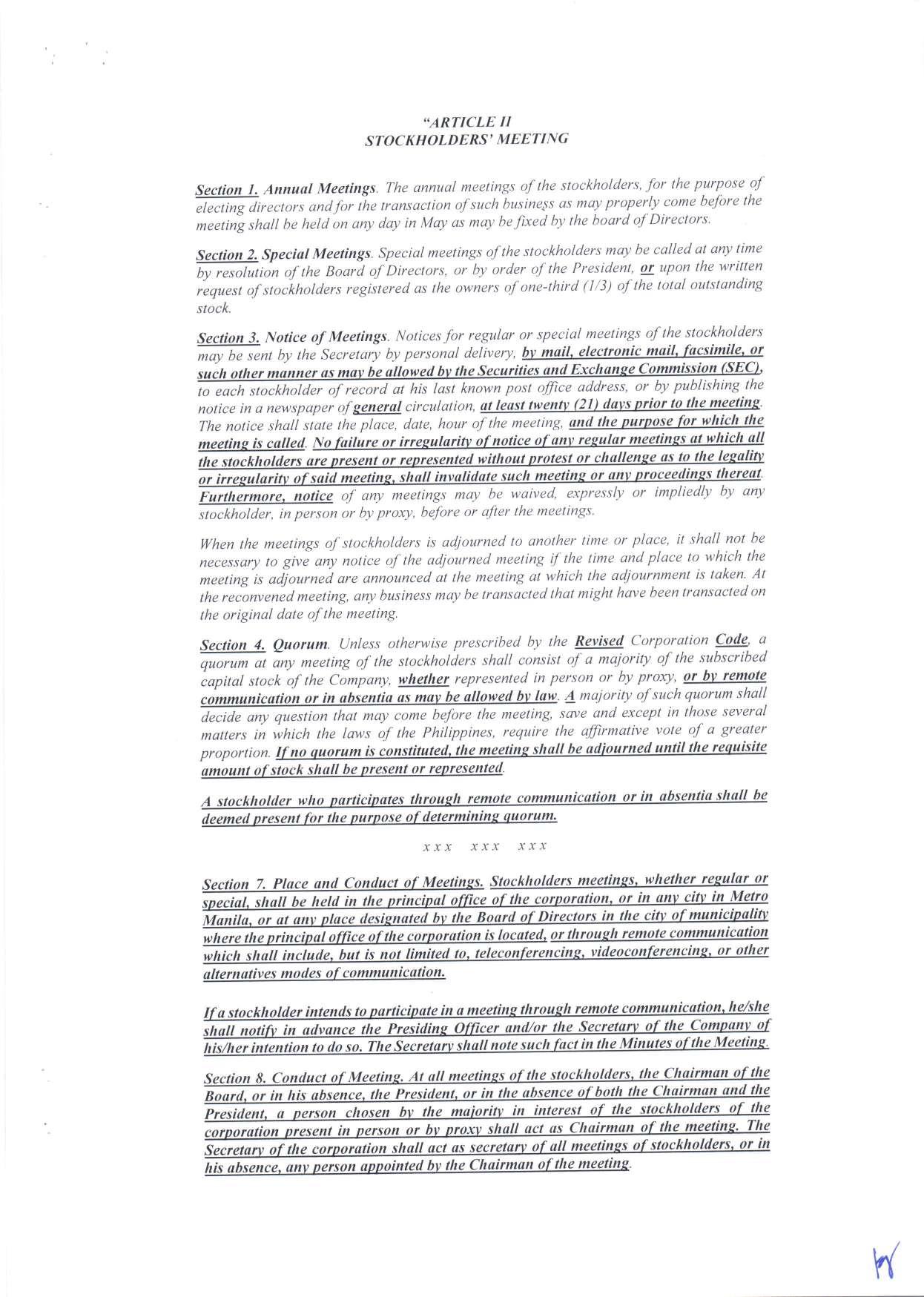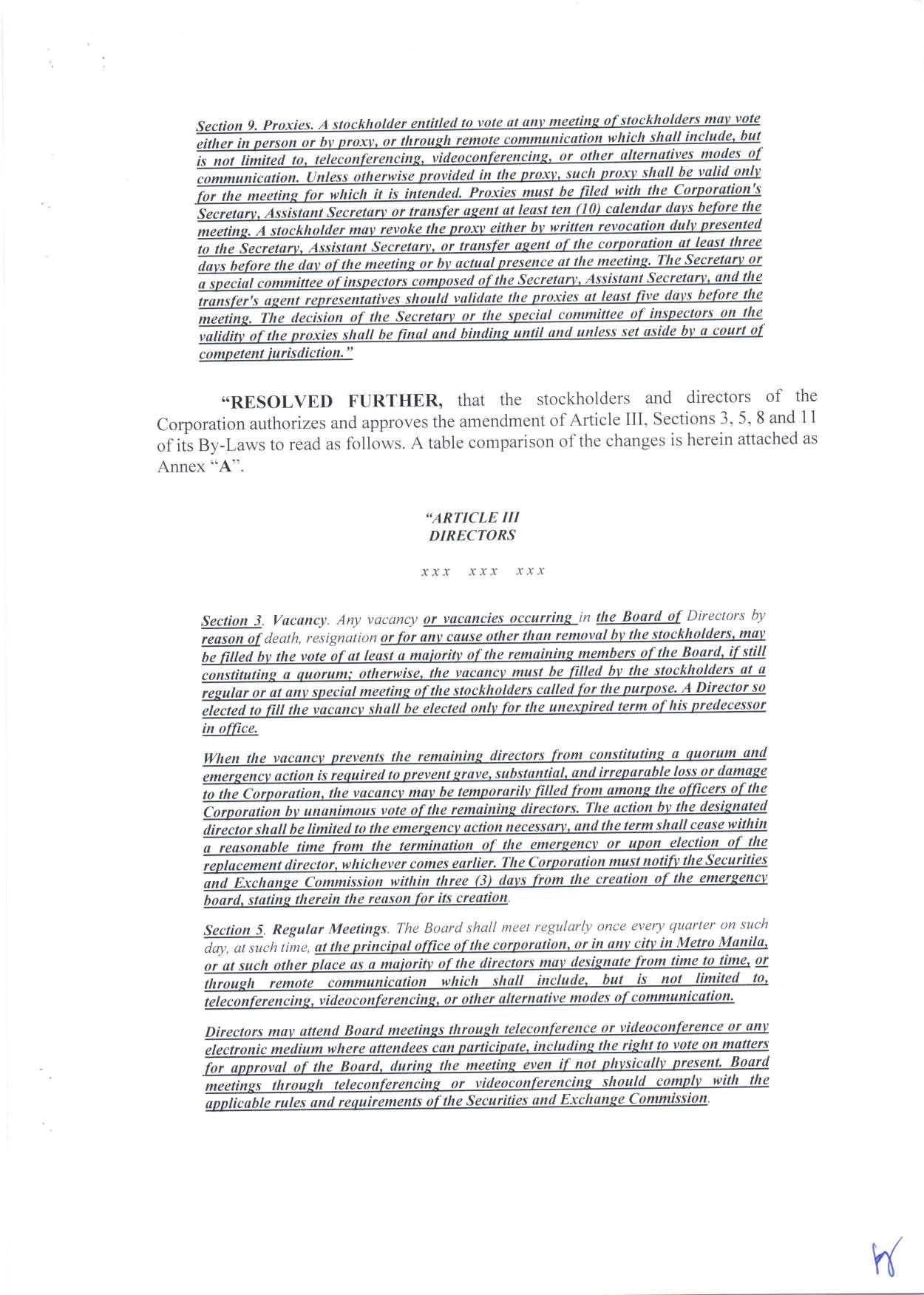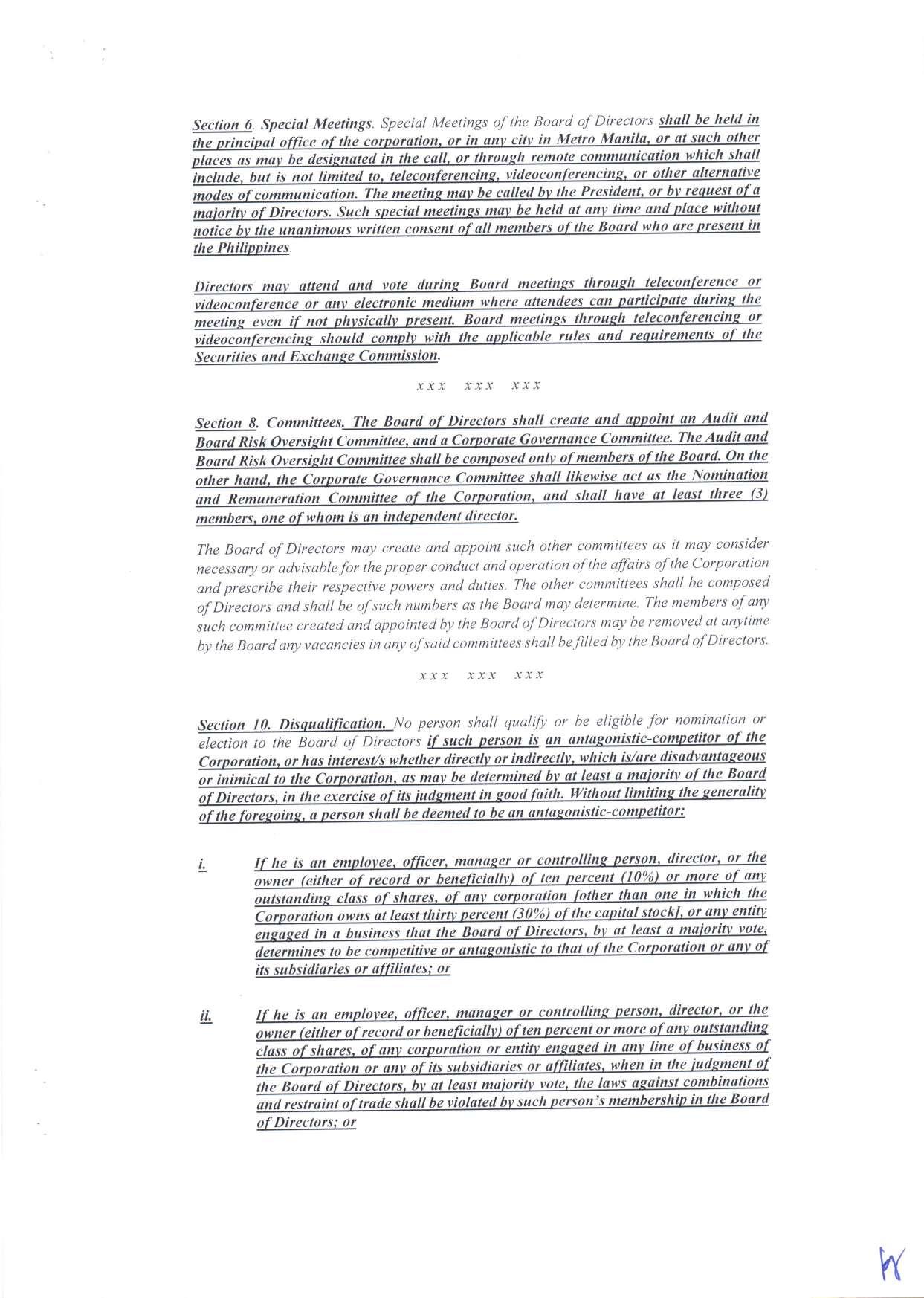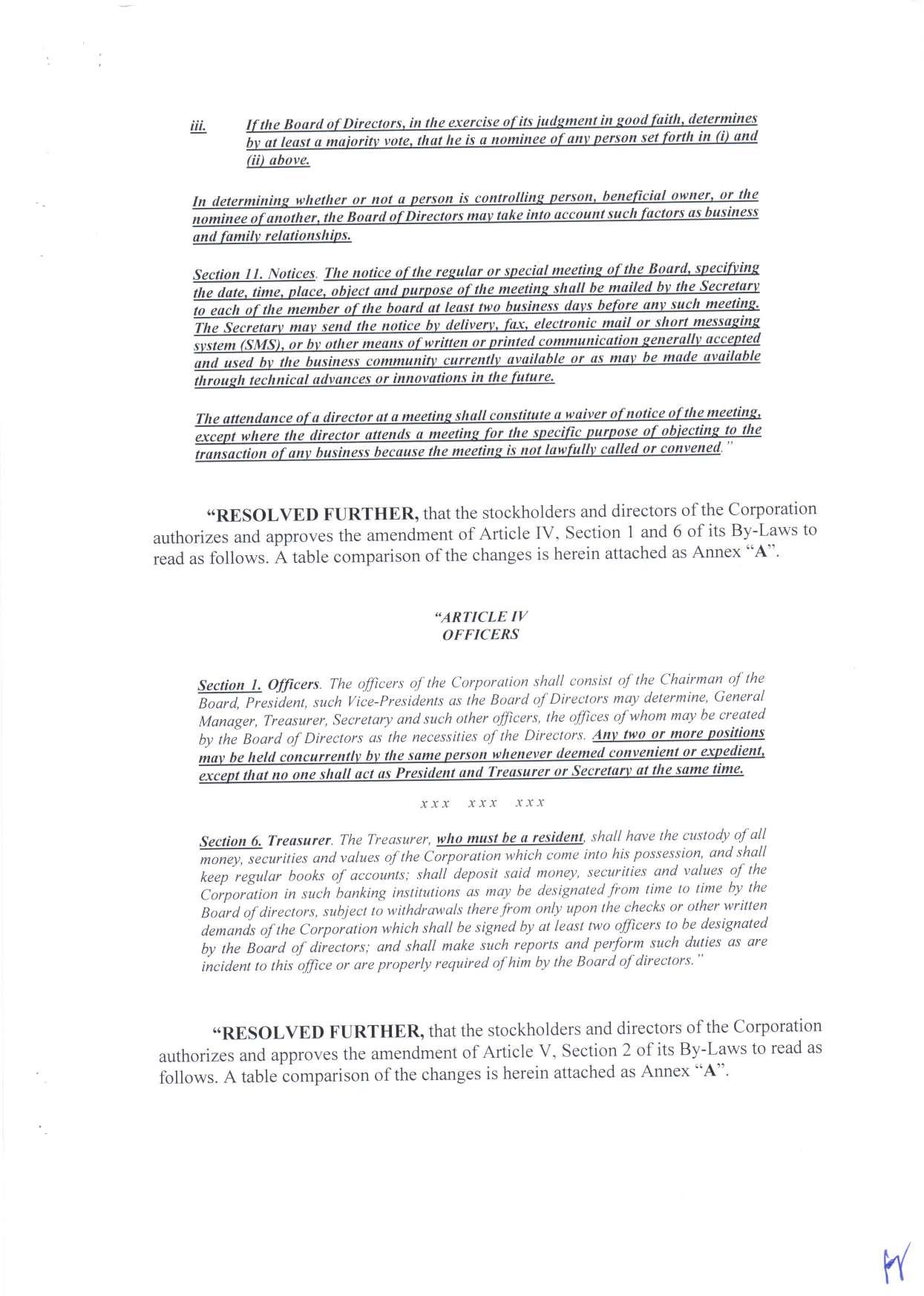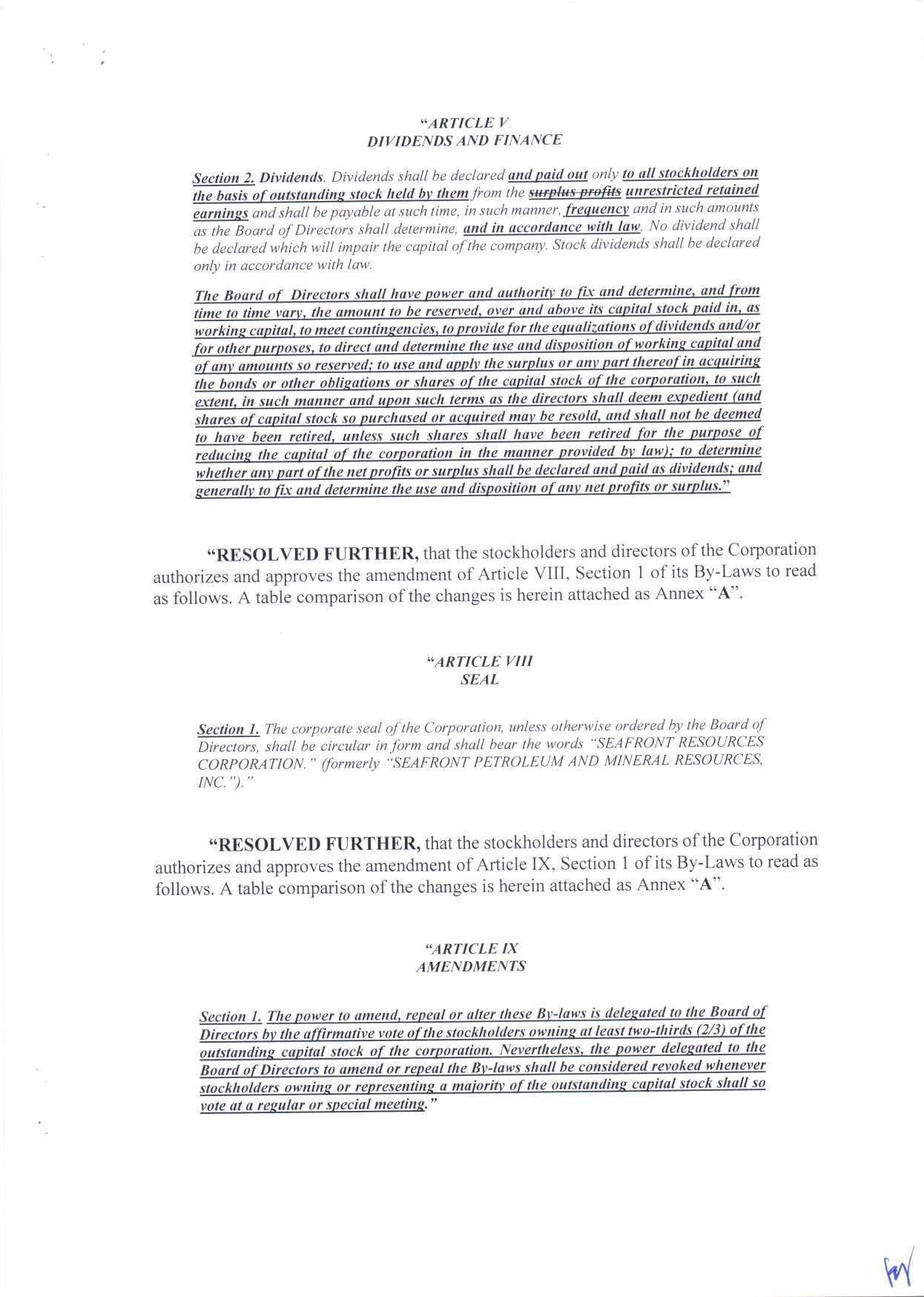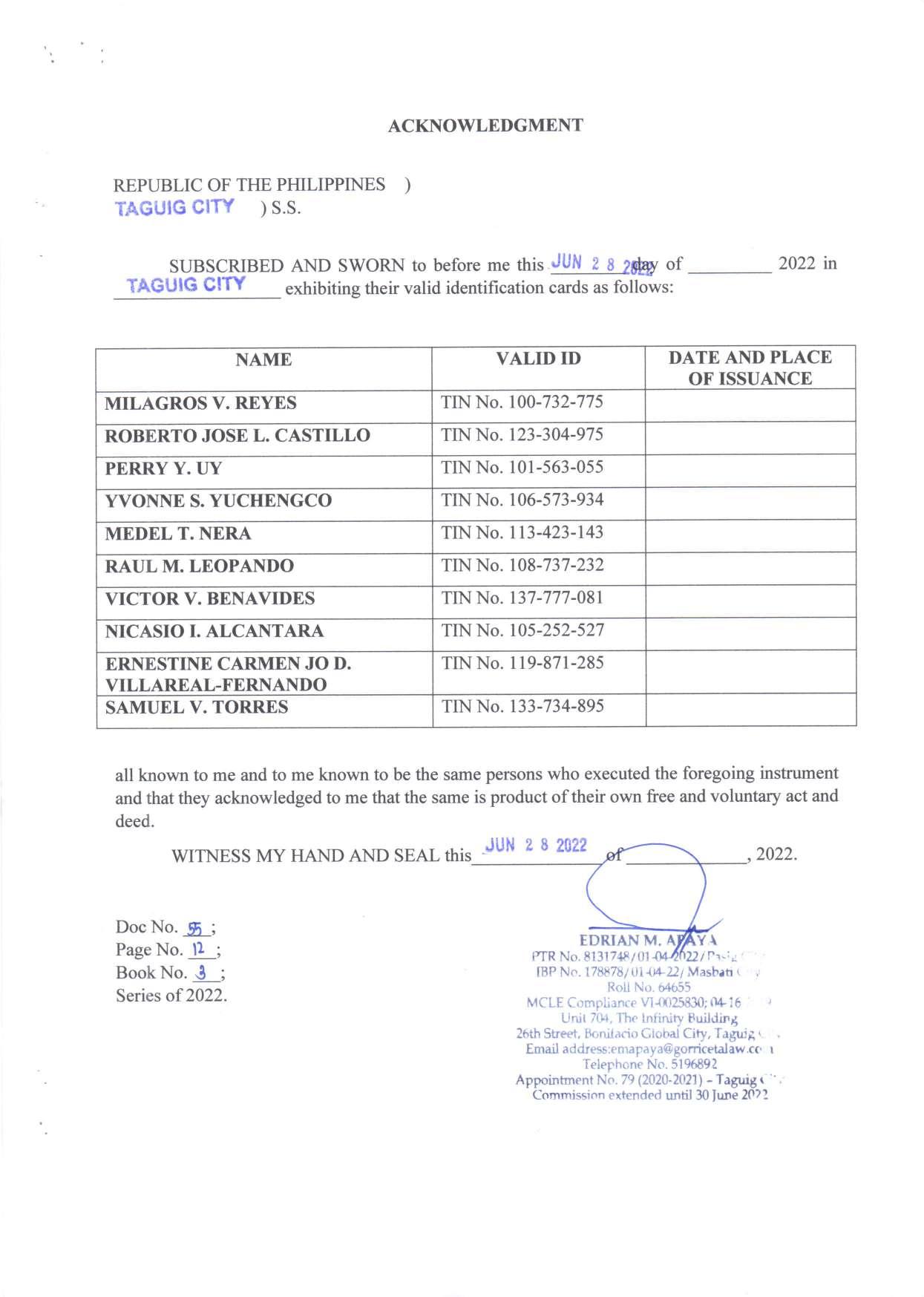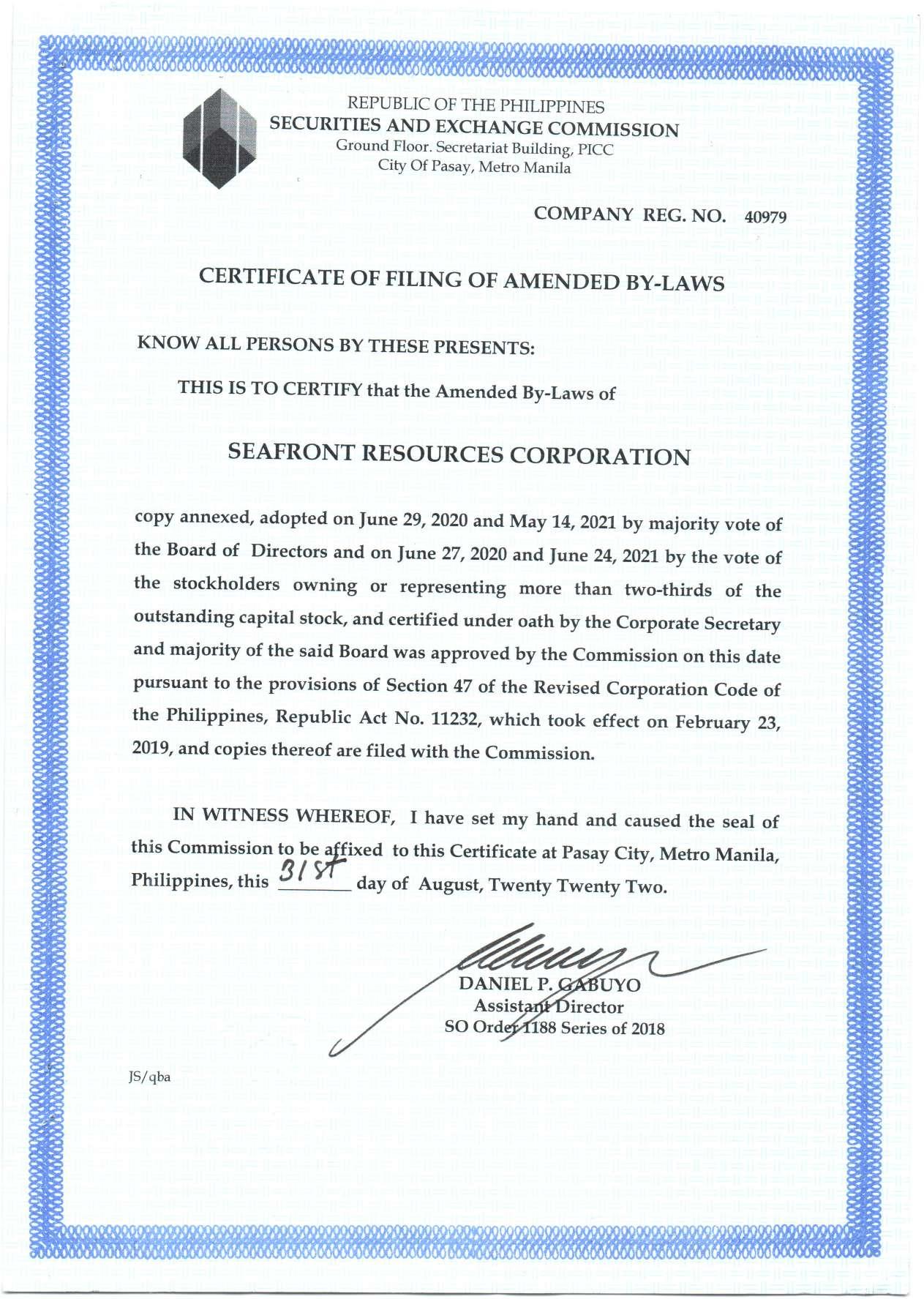
16 minute read
SEAFRONT RESOURCES CORPORATION
Summary of Proposed Amendments to By-laws
Article and Section Nos. From To
Advertisement
Article I, Section 1 Section 1. Certificates of Stock. Each stockholder whose subscription has been fully paid shall be entitled to one or more certificates of stock showing the number of shares registered in his name. It shall be signed by the President and countersigned by the Secretary of the Company and sealed with its corporate seal. The certificates of stock shall be issued n consecutive order and upon the stub of each certificate shall be entered the number of the certificate, date of issue, number of shares, name of stockholders, address and such other pertinent data that may be necessary. The stub shall be signed by the stockholder upon issuance to him of the corresponding certificate and shall be considered, for all purposes of the corporation, as a valid receipt therefore from the stockholders. The necessary documentary stamps for each certificate of stock shall be borne by the stockholders, purchaser or transferee.
Article I, Section 3 Section 3. Transfer of Stock. Certificates of stock may be sold, transferred or hypothecated by endorsement or separate deed, but the corporation shall not consider any transfer effective until the endorsed certificate is submitted for cancellation and a new one issued in the name of the transferee.
All certificates submitted for transfer to another name shall be marked “CANCELED” by the Secretary and attached to its corresponding stub whereon the following data shall be shown: a. The date when the shares were transferred. b. To whom transferred. c. Number of shares transferred.
Number or numbers of the new certificate or certificates.
Section 1. Certificates of Stock. Each stockholder whose subscription has been fully paid shall be entitled to a certificate of stock showing the number of shares registered in his name. It shall be signed by the President and countersigned by the Secretary of the Company and sealed with its corporate seal. The certificates of stock shall be issued in consecutive order and upon the stub of each certificate shall be entered the number of the certificate, date of issue, number of shares, name of stockholders, address and such other pertinent data that may be necessary. The stub shall be signed by the stockholder upon issuance to him of the corresponding certificate and shall be considered, for all purposes of the corporation, as a valid receipt therefore from the stockholders. The necessary documentary stamps for each share issued shall be borne by the stockholders, purchaser or subscriber
Article I, Section 4 Section 4. Lost, Stolen or Destroyed Certificates. Duplicate certificates of stock may be issued, in lieu of any certificate or certificates alleged to have been lost or destroyed only upon compliance with the requirements of the Corporation Code.
Article I, Section 6 Section 6. Inspection of the Stock Book or Register. The Stock Book or Register shall be available for inspection by any stockholder at a reasonable time during the office hours of the corporation.
Article I, Section 7 None
Article II, Section 1 Section 1. Annual Meetings. The annual meetings of the stockholders, for the purpose of electing directors and for the transaction of such business as may properly come before the
Section 3. Transfer of Stock
Subject to restrictions, terms and conditions contained in the Articles of Incorporation, shares may be transferred, sold, assigned or pledged by delivery of the certificates of stock duly indorsed by the stockholder, his attorney-in-fact or other legally authorized person. The transfer shall be valid and binding on the corporation only upon record thereof in the books of the corporation
All certificates submitted for transfer to another name shall be marked “CANCELLED” by the Secretary and attached to its corresponding stub whereon the following data shall be shown: a. The date when the shares were transferred. b. To whom transferred. c. Number of shares transferred. d. Number or numbers of the new certificate or certificates.
No share of stock against which the corporation holds unpaid claim shall be transferable in the books of the corporation.
Section 4. Lost, Stolen or Destroyed Certificates. Duplicate certificates of stock may be issued, in lieu of any certificate or certificates alleged to have been lost or destroyed only upon compliance with the requirements of the Revised Corporation Code.
Section 6. Inspection of the Stock Book or Register. The Stock and Transfer Book or Register shall be available for inspection by any stockholder at a reasonable time during the office hours of the corporation.
Section 7. Treasury Shares. The treasury shares of the corporation shall consists of such issued, fully paid and outstanding stock of the corporation as may be donated to it, or otherwise reacquired by it either through purchase, redemption or other lawful means, and shall be held subject to disposal by the Board of Directors or the stockholders as the case may be. Such stock shall neither vote nor participate in dividends while held by the corporation.
Section 1. Annual Meetings. The annual meetings of the stockholders, for the purpose of electing directors and for the transaction of such business as may properly come meeting shall be held in the principal office of the Corporation or at any place designated by the Board of Directors in the city or municipality where the principal office of the Corporation is located on any day in May as may be fixed by the board of Directors. before the meeting shall be held on any day in June as may be fixed by the board of Directors.
Article II, Section 2 Section 2. Special Meetings. Special meetings of the stockholders may be called at the principal office of the Company at any time by resolution of the Board of Directors, or by order of the President, and must be called upon the written request of stockholders registered as the owners of one-third (1/3) of the total outstanding stock.
Article II, Section 3 Section 3. Notice of Meetings. Notices for regular or special meetings of the stockholders may be sent by the Secretary by personal delivery, or by mailing the notice at least fifteen (15) days prior to the date of the meetings to each stockholder of record at his last known post office address, or by publishing the notice in a newspaper of national circulation. The notice shall state the place, date, and hour of the meeting, and in case of a special meeting for the purpose for which the meetings is called. Notice of any meetings may be waived, expressly or impliedly by any stockholder, in person or by proxy, before or after the meetings.
Section 2. Special Meetings. Special meetings of the stockholders may be called at any time by resolution of the Board of Directors, or by order of the President, or upon the written request of stockholders registered as the owners of one-third (1/3) of the total outstanding stock.
Section 3. Notice of Meetings. Notices for regular or special meetings of the stockholders may be sent by the Secretary by personal delivery, by mail, electronic mail, facsimile, or such other manner as may be allowed by the Securities and Exchange Commission (SEC), to each stockholder of record at his last known post office address, or by publishing the notice in a newspaper of general circulation, at least twenty (21) days prior to the meeting. The notice shall state the place, date, hour of the meeting, and the purpose for which the meeting is called. No failure or irregularity of notice of any regular meetings at which all the stockholders are present or represented without protest or challenge as to the legality or irregularity of said meeting, shall invalidate such meeting or any proceedings thereat Furthermore, notice of any meetings may be waived, expressly or impliedly by any stockholder, in person or by proxy, before or after the meetings.
Article II, Section 4 Section 4. Quorum. Unless otherwise prescribed by the Corporation Law, a quorum at any meeting of the stockholders shall consist of a majority of the subscribed capital stock of the Company represented in person or by proxy, and a majority of such quorum shall decide any question that may come before the meeting, save and except in those several matters in which the laws of the Philippines require the affirmative vote of a greater proportion.
Section 4. Quorum. Unless otherwise prescribed by the Revised Corporation Code, a quorum at any meeting of the stockholders shall consist of a majority of the subscribed capital stock of the Company, whether represented in person or by proxy, or by remote communication or in absentia as may be allowed by law A majority of such quorum shall decide any question that may come before the meeting, save and except in those several matters in which the laws of the Philippines, require the affirmative vote of a greater proportion. If no quorum is constituted, the meeting shall be adjourned until the requisite amount of stock shall be present or represented
A stockholder who participates through remote communication or in absentia shall be deemed present for the purpose of determining quorum.
Article II, Section 7 None
Article II, Section 8 None
Section 7. Place and Conduct of Meetings. Stockholders meetings, whether regular or special, shall be held in the principal office of the corporation, or in any city in Metro Manila, or at any place designated by the Board of Directors in the city of municipality where the principal office of the corporation is located, or through remote communication which shall include, but is not limited to, teleconferencing, videoconferencing, or other alternatives modes of communication.
If a stockholder intends to participate in a meeting through remote communication, he/she shall notify in advance the Presiding Officer and/or the Secretary of the Company of his/her intention to do so. The Secretary shall note such fact in the Minutes of the Meeting
Section 8. Conduct of Meeting. At all meetings of the stockholders, the Chairman of the Board, or in his absence, the President, or in the absence of both the Chairman and the President, a person chosen by the majority in interest of the stockholders of the corporation present in person or by proxy shall act as Chairman of the meeting. The
Secretary of the corporation shall act as secretary of all meetings of stockholders, or in his absence, any person appointed by the Chairman of the meeting
Article II, Section 9 None Section 9. Proxies. A stockholder entitled to vote at any meeting of stockholders may vote either in person or by proxy, or through remote communication which shall include, but is not limited to, teleconferencing, videoconferencing, or other alternatives modes of communication. Unless otherwise provided in the proxy, such proxy shall be valid only for the meeting for which it is intended. Proxies must be filed with the Corporation's Secretary, Assistant Secretary or transfer agent at least ten (10) calendar days before the meeting. A stockholder may revoke the proxy either by written revocation duly presented to the Secretary, Assistant Secretary, or transfer agent of the corporation at least three days before the day of the meeting or by actual presence at the meeting. The Secretary or a special committee of inspectors composed of the Secretary, Assistant Secretary, and the transfer's agent representatives should validate the proxies at least five days before the meeting. The decision of the Secretary or the specialcommittee of inspectors on thevalidity of the proxies shall be final and binding until and unless set aside by a court of competent jurisdiction.
Article III, Section 3 Section 3. Vacancy. If any vacancy shall occur among the Directors by death, resignation or otherwise, any meeting at which a quorum shall be present. In case of vacancy in the Board, the remaining Directors shall continue to act, but if at any time their number be reduced to less than a quorum, the Directors shall call a special meeting of the stockholders for the purpose of filling such vacancies.
Section 3 Vacancy. Any vacancy or vacancies occurring in the Board of Directors by reason of death, resignation or for any cause other than removal by the stockholders, may be filled by the vote of at least a majority of the remaining members of the Board, if still constituting a quorum; otherwise, the vacancy must be filled by the stockholders at a regular or at any special meeting of the stockholders called for the purpose. A Director so elected to fill the vacancy shall be elected only for the unexpired term of his predecessor in office.
When the vacancy prevents the remaining directors from constituting a quorum and emergency action is required to prevent grave, substantial, and irreparable loss or damage to the Corporation, the vacancy may be temporarily filled from among the officers of the Corporation by unanimous vote of the remaining directors. The action by the designated director shall be limited to the emergency action necessary, and the term shall cease within a reasonable time from the termination of the emergency or upon election of the replacement director, whichever comes earlier. The Corporation must notify the Securities and Exchange Commission within three (3) days from the creation of the emergency board, stating therein the reason for its creation
Section 5 Regular Meetings. The Board shall meet regularly once every quarter on such day, at such time, at the principal office of the corporation, or in any city in Metro Manila, or at such other place as a majority of the directors may designate from time to time, or through remote communication which shall include, but is not limited to, teleconferencing, videoconferencing, or other alternative modes of communication.
Directors may attend Board meetings through teleconference or videoconference or any electronic medium where attendees can participate, including the right to vote on matters for approval of the Board, during the meeting even if not physically present. Board meetings through teleconferencing or videoconferencing should comply with the applicable rules and requirements of the Securities and Exchange Commission
Article III, Section 6 Section 6. Special Meetings. Special Meetings of the Board of Directors shall consist of a majority of the entire membership of the Board. A majority of such quorum shall decide any question that may come before the meeting.
Section 6 Special Meetings. Special Meetings of the Board of Directors shall be held in the principal office of the corporation, or in any city in Metro Manila, or at such other places as may be designated in the call, or through remote communication which shall include, but is not limited to, teleconferencing, videoconferencing, or other alternative modesof communication. Themeeting may be called by the President, or by request of a majority of Directors. Such special meetings may be held at any time and place without notice by the unanimous written consent of all members of the Board who are present in the Philippines.
Directors may attend and vote during Board meetings through teleconference or videoconference or any electronic medium where attendees can participate during the meeting even if not physically present. Board meetings through teleconferencing or videoconferencing should comply with the applicable rules and requirements of the Securities and Exchange Commission
Article III, Section 10 Section 10. Disqualification. No person shall qualify or be eligible for nomination or election to the Board of Directors if the Board of Directors, by at least a majority vote of all its members, determines that such person is engaged in or is otherwise connected with any business which is antagonistic and / or inimical to that of the Corporation.
Section 10. Disqualification. No person shall qualify or be eligible for nomination or election to the Board of Directors if such person is an antagonistic-competitor of the Corporation, or has interest/s whether directly or indirectly,which is/are disadvantageousor inimical to the Corporation, as may be determined by at least a majority of the Board of Directors, in the exercise of its judgment in good faith. Without limiting the generality of the foregoing, a person shall be deemed to be an antagonisticcompetitor: i. If he is an employee, officer, manager or controlling person, director, or the owner (either of record or beneficially) of ten percent (10%) or more of any outstanding class of shares, of any corporation [other than one in which the Corporation owns at least thirty percent (30%) of the capital stock], or any entity engaged in a business that the Board of Directors, by at least a majority vote, determines to be competitive or antagonistic to that of the Corporation or any of its subsidiaries or affiliates; or ii. If he is an employee, officer, manager or controlling person, director, or the owner (either of record or beneficially) of ten percent or more of any outstanding class of shares, of any corporation or entity engaged in any line of business of the Corporation or any of its subsidiaries or affiliates, when in the judgment of the Board of Directors, by at least majority vote, the laws against combinations and restraintof tradeshallbeviolatedbysuch person’s membership in the Board of Directors; or iii. If the Board of Directors, in the exercise of its judgment in good faith, determines by at least a majority vote, that he is a nominee of any person set forth in (i) and (ii) above.
Article III, Section 11 None
Article IV, Section 1 Section 1. Officers. The officers of the Corporation shall consist of the Chairman of the Board, President, such Vice-Presidents as the Board of Directors may determine, General Manager, Treasurer, Secretary and such other officers, the offices of whom may be created by the Board of Directors as the necessities of the Directors. An officer may hold more than one office provided the duties thereof are not incompatible.
The Chairman of the Board, and President shall be members of the Board of Directors.
Article IV, Section 6 Section 6. Treasurer. The Treasurer shall have the custody of all money, securities and values of the Corporation which come into his possession, and shall keep regular books of accounts; shall deposit said money, securities and values of the Corporation in such banking institutions as may be designated from time to time by the Board of directors, subject to withdrawals there from only upon the checks or other written demands of the Corporation which shall be signed by at least two officers to be designated by the Board of directors; and shall make such reports and perform such duties as are incident to this office or are properly required of him by the Board of directors.
Article V, Section 2 Section 2. Dividends. Dividends shall be declared only from the surplus profits and shall be payable at such time, in such manner and in such amounts as the Board of Directors shall determine. No dividend shall be shall be declared which will impair the capital of the company. Stock dividends shall be declared only in accordance with law.
In determining whether or not a person is controlling person, beneficial owner, or the nominee of another, the Board of Directors may take into account such factors as business and family relationships.
Section 11. Notices The notice of the regular or special meeting of the Board, specifying the date, time, place, object and purpose of the meeting shall be mailed by the Secretary to each of the member of the board at least two business days before any such meeting. The Secretary may send the notice by delivery, fax, electronic mail or short messaging system (SMS), or by other means of written or printed communication generally accepted and used by the business community currently available or as may be made available through technical advances or innovations in the future.
The attendance of a director at a meeting shall constitute a waiver of notice of the meeting, except where the director attends a meeting for the specific purpose of objecting to the transaction of any business because the meeting is not lawfully called or convened
Section 1. Officers. The officers of the Corporation shall consist of the Chairman of the Board, President, such VicePresidents as the Board of Directors may determine, General Manager, Treasurer, Secretary and such other officers, the offices of whom may be created by the Board of Directors as the necessities of the Directors. Any two or more positions may be held concurrently by the same person whenever deemed convenient or expedient, except that no one shall act as President and Treasurer or Secretary at the same time.
Section 6. Treasurer. The Treasurer, who must be a resident, shall have the custody of all money, securities and values of the Corporation which come into his possession, and shall keep regular books of accounts; shall deposit said money, securities and values of the Corporation in such banking institutions as may be designated from time to time by the Board of directors, subject to withdrawals there from only upon the checks or other written demands of the Corporation which shall be signed by at least two officers to be designated by the Board of directors; and shall make such reports and perform such duties as are incident to this office or are properly required of him by the Board of directors.
Section 2. Dividends. Dividends shall be declared and paid out only to all stockholders on the basis of outstanding stock held by them from the surplus profits unrestricted retained earnings and shall be payable at such time, in such manner, frequency and in such amounts as the Board of Directors shall determine, and in accordance with law. No dividend shall be shall be declared which will impair the capital of the company. Stock dividends shall be declared only in accordance with law.
The Board of Directors shall have power and authority to fix and determine, and from time to time vary, the amount to be reserved, over and above its capital stock paid in, as working capital, to meet contingencies, to provide for the equalizations of dividends and/or for other purposes, to direct and determine the use and disposition of working capital and of any amounts so reserved; to use and apply the surplus or any part thereof in acquiring the bonds or other obligations or shares of the capital stock of the corporation, to such extent, in such manner and upon such terms as the directors shall deem expedient (and shares of
Article VIII, Section 1 Section 1. The corporate seal of the Corporation, unless otherwise ordered by the Board of Directors, shall be circular in form and shall bear the words “SEAFRONT RESOURCES CORPORATION.” (formerly “SEAFRONT PETROLEUM AND MINERAL RESOURCES, INC.”) capital stock so purchased or acquired may be resold, and shall not be deemed to have been retired, unless such shares shall have been retired for the purpose of reducing the capital of the corporation in the manner provided by law); to determine whether any part of the net profits or surplus shall be declared and paid as dividends; and generally to fix and determine the use and disposition of any net profits or surplus.
Article IX, Section 1 Section 1. These By-Laws may be amended, repealed or altered, in whole or in part, by a majority vote of the entire subscribed capital stock of the company at any regular meeting of the shareholders, or at any special meeting where such action has been announced in the cell and notice of such meeting.
Section 2. The Board of Directors may adopt additional rules in harmony with foregoing By-Laws and their amendments, but shall not alter, modify or repeal the foregoing By-Laws and their amendments.
Section 3. These By-Laws shall take effect immediately after the approval of the stockholders.
Section 1. The corporate seal of the Corporation, unless otherwise ordered by the Board of Directors, shall be circular in form and shall bear the words “SEAFRONT RESOURCES CORPORATION.” (formerly “SEAFRONT PETROLEUM AND MINERAL RESOURCES, INC.”). The Board has full authority to revise the corporate seal.
Section 1. The power to amend, repeal or alter these Bylaws is delegated to the Board of Directors by the affirmative vote of the stockholders owning at least twothirds (2/3) of the outstanding capital stock of the corporation. Nevertheless, the power delegated to the Board of Directors to amend or repeal the By-laws shall be considered revoked whenever stockholders owning or representing a majority of the outstanding capital stock shall so vote at a regular or special meeting
